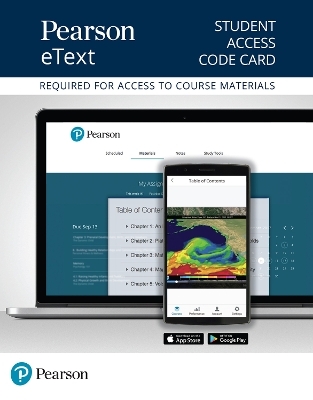
Environmental Science
Pearson (Hersteller)
978-0-13-485716-9 (ISBN)
- Titel z.Zt. nicht lieferbar
- Versandkostenfrei innerhalb Deutschlands
- Auch auf Rechnung
- Verfügbarkeit in der Filiale vor Ort prüfen
- Artikel merken
The 13th Edition of Environmental Science: Toward a Sustainable Future retains its current content and memorable themes of Science, Sustainability and Stewardship while expanding on the reader-friendly approach with built-in tools that make Wright/Boorse a bestseller. Presenting the most current and relevant Environmental Science issues and research along with new Concept Check and Understand the Data questions, the text helps readers understand the science behind environmental issues.
For introductory courses in Environmental Science, Environmental Studies, and Environmental Biology.
Pearson eText is an easy-to-use digital textbook that you can purchase on your own or instructors can assign for their course. The mobile app lets you keep on learning, no matter where your day takes you, even offline. You can also add highlights, bookmarks, and notes in your Pearson eText to study how you like.
NOTE: This ISBN is for the Pearson eText access card. Pearson eText is a fully digital delivery of Pearson content. Before purchasing, check that you have the correct ISBN. To register for and use Pearson eText, you may also need a course invite link, which your instructor will provide. Follow the instructions provided on the access card to learn more.
Richard T. Wright is Professor Emeritus of Biology at Gordon College in Massachusetts, where he taught environmental science for 28 years. He earned a B.A. from Rutgers University and a M.A. and Ph.D. in biology from Harvard University. For many years Wright received grant support from the National Science Foundation for his work in marine microbiology, and in 1981, he was a founding faculty member of Au Sable Institute of Environmental Studies in Michigan, where he also served as Academic Chairman for 11 years. He is a Fellow of the American Association for the Advancement of Science, Au Sable Institute, and the American Association for the Advancement Scientific Affiliation. In 1996, Wright was appointed a Fulbright Scholar to Daystar University in Kenya, where he taught for two months. He is a member of many environmental organizations, including The Nature Conservancy, Habitat for Humanity, the Union of Concerned Scientists, the Audubon Society, and a supporting member of the Trustees of Reservations. Wright continues to be actively involved in writing and speaking about the environment. He and his wife Ann recently moved to Byfield, Massachusetts, and they drive a Toyota Camry hybrid vehicle as a means of reducing their environmental impact. Wright spends his spare time hiking, fishing, golfing, and enjoying his three children and seven grandchildren. Dorothy F. Boorse is an associate professor of biology at Gordon College, in Wenham Massachusetts. Her research interest is in drying wetlands such as vernal pools and prairie potholes, and in salt marshes. Her research with undergraduates has included wetland and invasive species projects. She earned a BS in biology from Gordon College, a MS in entomology from Cornell University, and a PhD in oceanography and limnology from the University of Wisconsin-Madison. Boorse teaches, writes, and speaks about biology, the environment, and care of creation. An essay she wrote on climate change was recently published in a book by the Union of Concerned Scientists and Penguin Press. In 2005 Boorse provided expert testimony on wildlife corridors and environmental ethics for a congressional House subcommittee hearing. Boorse is a member of a number of ecological and environmental societies including The Ecological Society of America, the Society of Wetland Scientists, the Nature Conservancy, The Audubon Society, The New England Wildflower Society, and the Trustees of Reservations (the oldest land conservancy group in the United States). She and her family live in Beverly Massachusetts. She and her family belong to Appleton farms, a CSA community supported agriculture farm. They are also members of a newly established community supported fishery, Cape Ann Fresh Catch. At home Boorse has a native plant garden and has recently planted two disease resistant elm trees.
I. FRAMEWORK FOR A SUSTATAINABLE FUTURE
1. Science and the Environment
2. Economics, Politics, and Public Policy
II. ECOLOGY: THE SCIENCE OF ORGANISMS AND THEIR ENVIRONMENT
3. Basic Needs of Living Things
4. Populations and Communities
5. Ecosystems: Energy, Patterns, and Disturbance
6. Wild Species and Biodiversity
7. The Use and Restoration of Ecosystems
III. THE HUMAN POPULATION AND ESSENTIAL RESOURCES
8. The Human Population
9. Population and Development
10. Water: Hydrologic Cycle and Human Use
11. Soil: Foundation for Land Ecosystems
12. The Production and Distribution of Food
13. Pests and Pest Control
IV. HARNESSING ENERGY FOR HUMAN SOCIETY
14. Energy from Fossil Fuels
15. Nuclear Power
16. Renewable Energy
V. POLLUTION AND PREVENTION
17. Environmental Hazards and Human Health
18. Global Climate Change
19. Atmospheric Pollution
20. Water Pollution and Its Prevention
21. Municipal Solid Waste: Disposal and Recovery
22. Hazardous Chemicals: Pollution and Prevention
VI. STEWARDSHIP FOR A SUSTAINABLE FUTURE
23. Sustainable Communities and Lifestyles
Appendix A: Environmental Organizations
Appendix B: Units of Measure
Appendix C: Units of MeasurE
| Sprache | englisch |
|---|---|
| Maße | 1 x 244 mm |
| Gewicht | 40 g |
| Themenwelt | Naturwissenschaften ► Biologie ► Ökologie / Naturschutz |
| Technik ► Umwelttechnik / Biotechnologie | |
| ISBN-10 | 0-13-485716-X / 013485716X |
| ISBN-13 | 978-0-13-485716-9 / 9780134857169 |
| Zustand | Neuware |
| Informationen gemäß Produktsicherheitsverordnung (GPSR) | |
| Haben Sie eine Frage zum Produkt? |